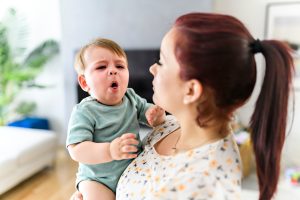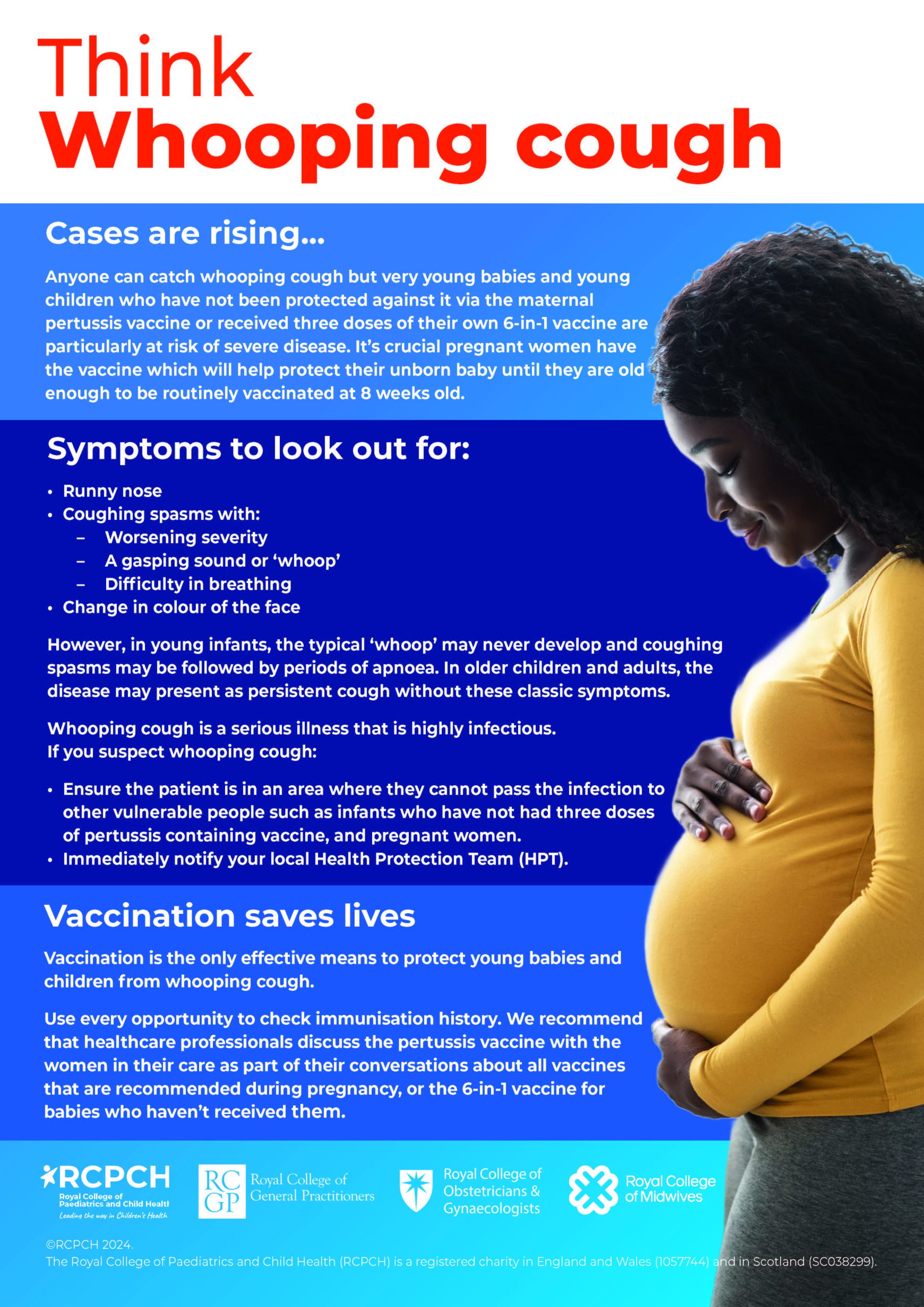Whooping cough – advice for parents and carers
Whooping cough (pertussis) is a bacterial infection of the lungs and breathing tubes. It causes bouts of coughing which may cause difficulty breathing. It spreads very easily through droplets from coughs and sneezes. In some babies and children it can cause them to be very unwell. It particularly important for babies and children to get vaccinated against it.
What is whooping cough?
Whooping cough (also called pertussis) is a highly contagious infection of the lungs and breathing tubes. It is called whooping cough as some people may experience a high-pitched intake of breath that sounds like “whoop” in between the bouts of coughing, though this is not present in everyone. Whooping cough is very contagious and can be extremely serious for babies and young children.
What are the symptoms of whooping cough?
Whooping cough starts like many viral illnesses with cold-like symptoms: a runny nose and coughing spasms with worsening severity. These severe bouts of coughing develop around one week after the initial symptoms are observed and are typically more common at night and can last a few minutes. The sometimes observed ‘whoop’ sound comes whilst gasping for breath between coughs and occasionally the coughing can cause difficulty in breathing. It is very important to seek help early especially if symptoms are severe, having an effect on breathing and skin colour is seen to be turning more dusky and blue.
Current concerns in the U.K. surrounding whooping cough
Whooping cough is known to be a ‘cyclical disease’, meaning that the rates of disease vary each year with an expected higher numbers of cases seen every three to five years. However, the UK is currently seeing unusually high numbers of cases, which health experts believe is due to a lower uptake of the vaccine that protects against whooping cough. Although whooping cough can affect people of all ages, for very young babies it can be extremely serious. Babies under 6 months old with whooping cough have a higher risk of problems including dehydration, breathing difficulties, pneumonia and seizures. We are very saddened to report that eight babies have died of whooping cough this year between January and the end of April 2024.
What can parents do to protect their children?
Vaccination
- Whooping cough is preventable with vaccination.
- All parents should check that their children’s vaccinations – and their own – are up-to-date.
- If the vaccinations are not up to date, it is vital to make an appointment to get vaccinated as soon as possible.
- It is also important for pregnant mothers to check their vaccination status as they can receive the vaccine. This will protect their newborn baby in their first two months of life.
- This vaccination is safe and effective for pregnant women to receive – we advise speaking to your midwife or obstetrician about this.
Seek medical assistance if you have symptoms
If you, or a member of your family, develops symptoms of whooping cough – especially a heavy wheezing cough that disrupts sleep, or a change in the colour of the face – then seek medical assistance.
Contact your GP if:
- You have general concerns around infectivity to others or vaccination. Your GP may offer you a remote consultation to assess the severity of your symptoms.
Ask for an urgent GP appointment or call 111 if:
- Your baby is under 6 months old and has symptoms of whooping cough
- You or your child have a very bad cough that is getting worse
- You’ve been in contact with someone with whooping cough and you’re pregnant
- You or your child has been in contact with someone with whooping cough and have a weakened immune system
- Whooping cough can spread very easily. It’s best to call the GP before you go in. They might suggest talking over the phone or taking you to an isolation room instead of sitting in the waiting room.
You can check symptoms on 111 online (for children aged 5 and over) or call 111 (for children under 5).
This current outbreak of whooping cough shows the importance of engaging with vaccination programmes – they’re in place for everyone’s safety and can prevent babies and children becoming seriously ill from preventable diseases.
Key messages for healthcare professionals
A joint statement on the current whooping cough outbreak from the Royal College of Obstetricians and Gynaecologists (RCOG), Royal College of Midwives (RCM), Royal College of General Practitioners (RCGP) and Royal College of Paediatrics and Child Health (RCPCH) are available to read on the RCPCH website: Whooping cough – poster and joint statement from RCPCH, RCOG, RCM and RCGP | RCPCH

